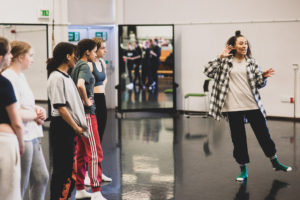
By Imogen Aujla
Freelancers — self-employed individuals who are paid by the hour, day, or job — often juggle a combination of roles within a multifaceted portfolio career. According to recent estimates, artists across all art forms in North America are 3.6 times more likely to be self-employed than other workers, and 81 percent of dancers and choreographers in the United Kingdom are self-employed. While these figures do not account for the multitude of roles that some artists take on within the dance industry (such as teachers, producers, managers, and healthcare providers), they do demonstrate that a significant proportion work on a freelance basis.
In 2019, I was one of four researchers from the University of Bedfordshire who undertook a large-scale study of over 500 freelancers in the UK. Findings revealed that most worked in several roles, the most common of which were teaching, choreographing, and performing. Participants reported relatively high levels of wellbeing and resilience, scoring particularly highly for personal growth and purpose in life, indicating that their work may provide meaning and opportunities for self-development.

Less positively, most participants agreed their pay was low, and was often not commensurate with experience or qualifications. As a result, many freelancers took on additional work in other sectors. The uncertainty of fluctuating working patterns and the social isolation that comes with freelancing (for instance, not working consistently within a team) could also be difficult to manage. Many participants reported that their training did not adequately prepare them for the challenges of freelance work, with one performer and teacher explaining, “As a student, you’re kind of in a bubble at any institution that you are at…I don’t think I ever knew what to expect [once I graduated].”
Our research further revealed that freelancers use a range of career-management and psychological skills as they navigate their careers. Often, freelancers develop these intuitively in response to the demands of their work, but if they were taught systematically during training, dance artists could feel more prepared for the complexities of managing a portfolio career.

Promisingly, a number of dance training institutions are beginning to add such topics to their offerings. Sadie Hunt, course coordinator of the BA (Hons) Dance and Professional Practice program at the University of Bedfordshire, explains how, over the last five years, employment-related skills and knowledge have gained space in students’ training. “In their first year this includes teaching students about broader industry structures, frameworks, and key organizations. In the second year, students are introduced to small, mid- and large-scale project design. In their final year, these employability skills are applied to real life contexts such as teaching and the design and delivery of community-facing projects.”
A gradual building of industry understanding could be usefully combined with practical skills. Gemma Whitelam, head of jazz at Dancebox College in Milton Keynes, explains that students are given support in writing resumés, designing websites, and understanding social media marketing. “We also help students create showreels before leaving, and we help them to understand how to save and budget for tax as a self-employed artist.”
Freelancers must also be capable of “selling themselves,” which does not always come naturally. As one choreographer explained, “I didn’t have the skills to articulate my practice.” Self-confidence, optimism, and communication skills can help freelancers explain their artistic vision, advocate for their work, negotiate fees and contracts, and successfully network to find support and opportunities. While these characteristics may at first glance seem innate— you either have them, or you don’t — they can be learned and developed. For example, self-confidence can be built by recognizing achievements, focusing on the task at hand rather than on comparison with others, setting and monitoring goals, and getting outside your comfort zone. This kind of psychological skill development could be built into dance programs to benefit students both in training and after graduation.
Finally, professionalism in behaviour and attitude is key. “Dancers find work through recommendation just as much as audition,” says Whitelam. “So, understanding etiquette, and realizing that the way you present yourself at auditions or in jobs counts, are very important.” Maintaining professional standards is crucial when establishing a reputation in the industry, especially as dance artists often find work through word of mouth. Educators could discuss the notion of professionalism with students, exploring what this might look like in practice.
Where once educational institutions were only tasked with developing students’ artistic skill, there is now recognition that it takes more than talent to forge a successful career in dance. Incorporating education on finances and funding, industry infrastructure, and psychological and social skills into dance programs will help ensure the next generation of artists don’t just survive, but thrive, in their freelance careers.
Imogen Aujla is a freelance dance psychology researcher, lecturer, and life coach who can be found at www.danceinmind.org.

